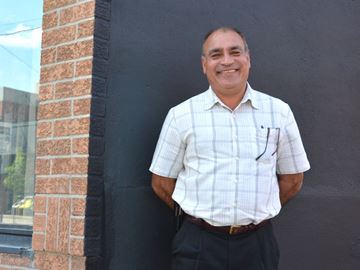CEO of new cannabis centre wants to ‘talk answers’
If Gulwant Bajwa had known medical marijuana
was an option when he developed a painful cancer two decades ago, he
would have tried it.
He would have tried anything.
Now, the 53-year-old is hoping to help other
suffering Canadians navigate the murky world of medical marijuana with
National Access Cannabis, an information centre where doctors can
prescribe weed.
The clinic will open an office in Hintonburg on June 23.
It’s not a dispensary; there’s “not a speck”
of pot on site, according to the new CEO, who left his job in Health
Canada’s medical marijuana program to join the company two months ago.
LET’S TALK ANSWERS
National Access Cannabis, which has adopted
the motto Let’s Talk Answers, is not trying to undermine the legal
medical marijuana system. On the contrary, its aim is to help patients
who are thinking about using cannabis to access it legally, safely and
responsibly, Bajwa said.
“I do not want to see Canadians have to go
to an illicit source. I want them to go to a legal source of supply,”
said Bajwa. “That way they get a safe medicine, they get a medicine that
is produced under some very strict rules and regulations, rather than
going to a street source where you don’t know what you’re getting.”
Medical marijuana is fast becoming a popular
alternative to pills in Canada, and has been shown to help a range of
ailments, from chronic pain to epilepsy. Health Canada recently
overhauled its program and is now licensing commercial producers to grow
marijuana for prescription use. There are currently 19 such producers
across the country, including one in Smiths Falls and another that just
opened in Gatineau.
While that has improved access somewhat,
Bajwa said the medical marijuana system in Canada is so confusing –
compounded by physicians who are uncomfortable or unknowledgeable when
it comes to prescribing cannabis – that he doesn’t blame people in pain
for resorting to the street.
But buying pot in an alleyway puts you at risk, he said.
Street weed could be laced with other drugs,
for one thing, or packed full of pesticides not fit for human
consumption. It’s also not necessarily the type of cannabis you need to
treat your illness.
Licensed producers develop a variety of
strains that offer differing levels of THC (the ingredient that makes
you high) and cannabidiol (the part with the most medical benefits).
Someone with late-stage cancer may need a
high-THC strain as a painkiller, while a person with schizophrenia needs
high levels of cannabidiol.
A centre like National Access Cannabis will
help patients figure out exactly what they need, Bajwa said.
PROCESS
The centre will be staffed with information
specialists, a pharmacist and several physicians (although depending on
their schedules the doctors may be Skyped in). All the staff have a high
degree of knowledge when it comes to medical marijuana, Bajwa said, and
will help guide patients through Canada’s system.
Membership is $99 for the year, and $50 to renew – that’s how the clinic will make its money.
For now, it will not collect referral fees to send patients to certain
producers, Bajwa said, although some clinics have been doing that
elsewhere in the country.
When you first enter the store, a greeter
will sit down with you to start a file; you’ll have to give detailed
information about the ailment you’re trying to fix. Next, the staff will
contact your family doctor to confirm the ailment is a real and
documented thing – this is to weed out any cheaters.
Once the basics have been established,
you’ll meet privately with a physician either in person or via Skype for
an in-depth interview and a once-over to determine if weed really is
the right solution.
If you pass inspection, the doctor will
issue a medical document outlining the dose and strain recommended to
treat your ailment, and an on-site pharmacist will make sure it won’t
adversely react with other drugs you’re taking.
And then you’re given a list of licensed
producers and invited to choose where you’d like to order your supply.
Bajwa stressed this isn’t an easy process,
nor should it be. He said the doctors will monitor a patient’s drug use
just like any other prescription. If you’re prescribed one gram a day
and you get a month’s supply, you’d better not be asking for more after
20 days, he said.
And if you’re too nervous to enter the store
in broad daylight, he said staff will make arrangements to meet with
you after hours.
The storefront is the company’s second in
Canada; the original is in Victoria. But the headquarters have shifted
to Ottawa so staff can be close to the policy makers shaping alternative
medicine in Canada, Bajwa said.
He said he wants to work with Health Canada
and other regulators to improve the system, because there is certainly a
long way to go. The fact that cannabis can really only be smoked or
vapourized right now is part of the reason doctors are so hesitant to
prescribe marijuana as a treatment – smoking is considered bad for your
health.
Bajwa said more research funding is needed
to explore new methods of delivery, such as capsules that can deliver
precise doses of THC and cannabidiol without the stigma of smoking.
“The day this industry matures enough to
have other delivery methods is the day physicians will be more on
board,” Bajwa said.
The store at 1111 Wellington St. will celebrate its grand opening at 10:30 a.m. on June 23.


No comments:
Post a Comment